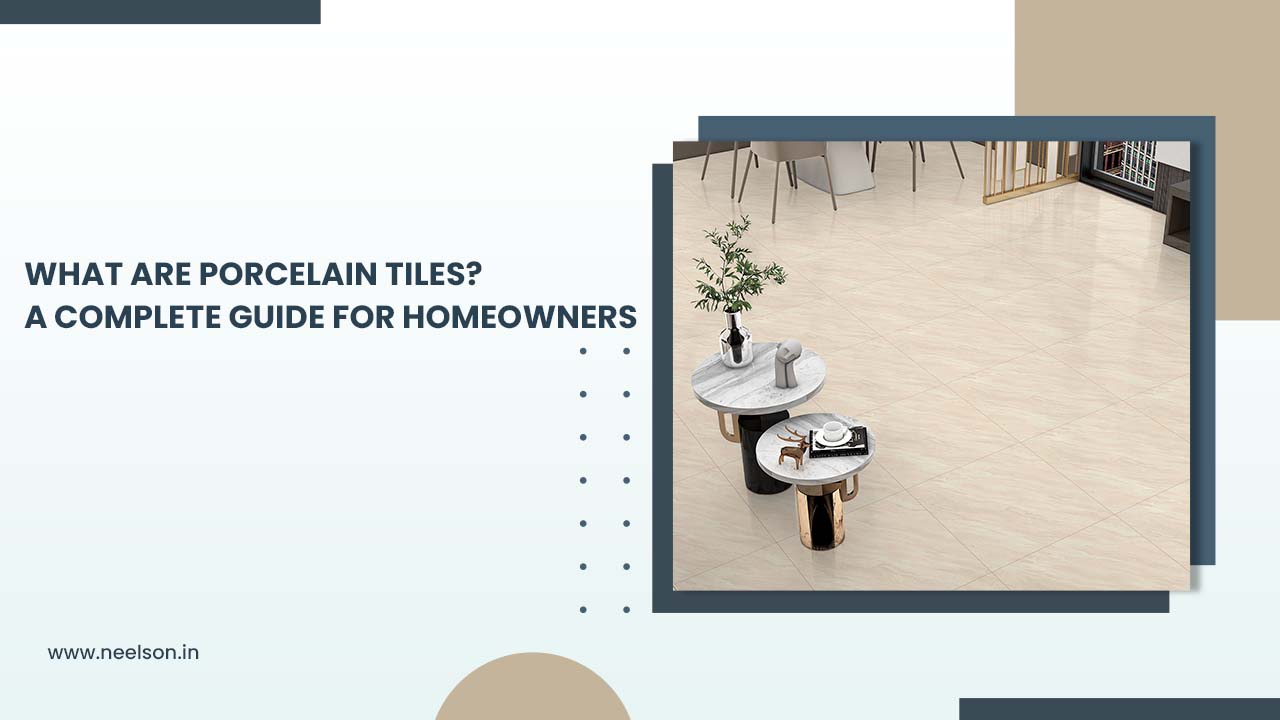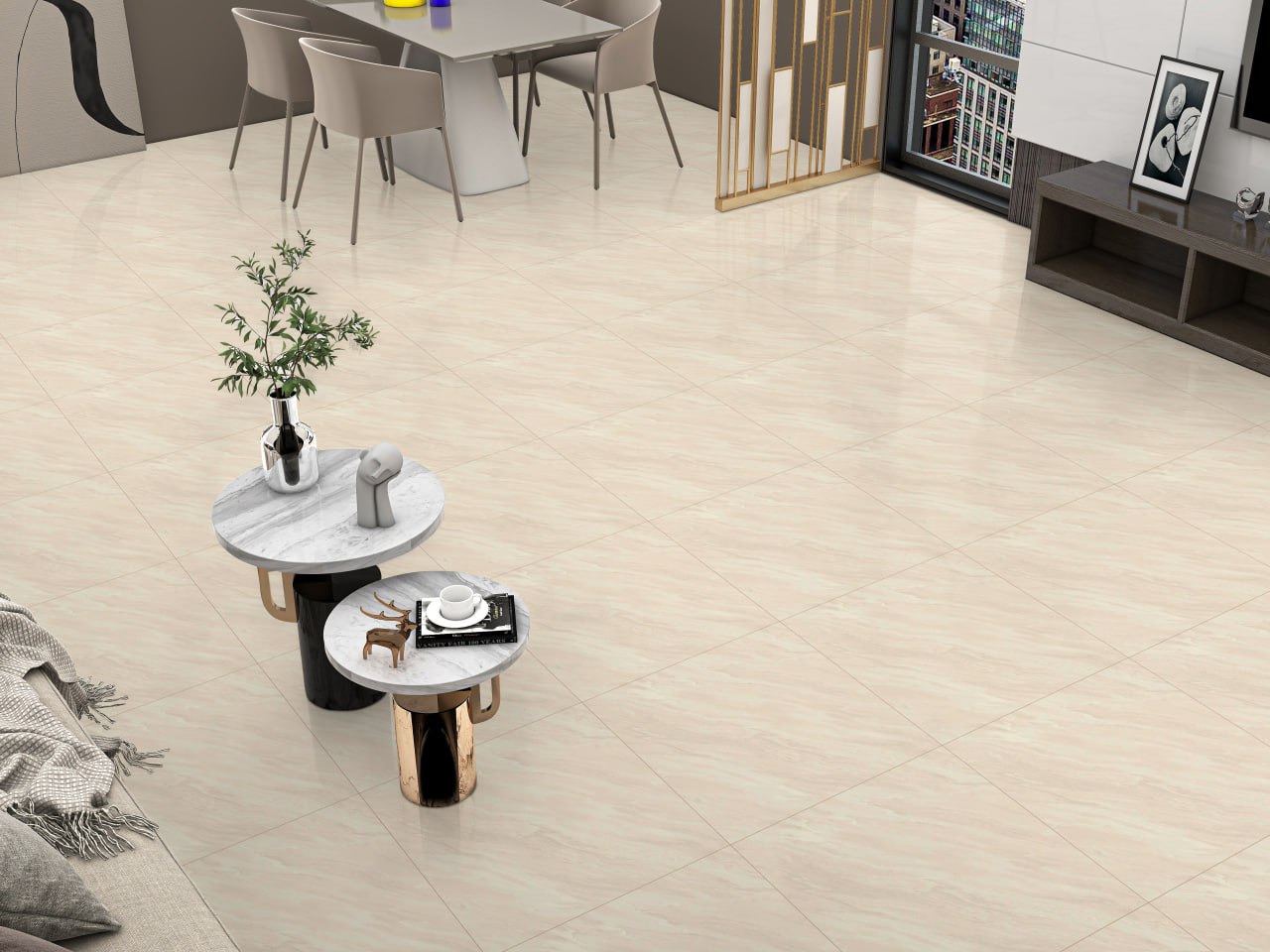
The first thing someone notices about a house is the flooring. Imagine greeting someone with a chic floor featuring striking and textured patterns. Very remarkable, isn't it? These effects are facilitated by porcelain tiles. In addition to its elegant and traditional appearance, porcelain is renowned for its smooth and glossy texture. The tiles also do this.
Porcelain tile has been used in homes and businesses for more than a century, decorating walls and floors with its magnificent beauty and exceptional functionality. Porcelain tiles were only used in kitchens and bathrooms in the past. They now mesmerize the entire house, though. Everything you need to know about porcelain tiles is explained in detail in this article. Before you buy tiles for your room, read it.
Neelson Ceramics, a renowned porcelain tiles exporter, provides you with an extensive guide that covers every detail of porcelain tiles.
History of Porcelain Tiles
Tiles have an unimaginably long history. Around the fifth century, the Egyptians are thought to have been the first to produce ceramic tile. These ceramic tiles have changed since then, and a wide variety of ceramic tile varieties have been released worldwide.
Porcelain tile is one such variety. "Porcellana" is an antique Italian word that refers to clay earthenware or cowrie shells. We know about porcelain dishes and dolls. Porcelain was employed for such purposes until the fifteenth century.
China employed porcelain to create tiles and the Porcelain Tower of Nanjing in the fifteenth century. These hand-painted porcelain tiles were very expensive back then. Therefore, at first, porcelain was mostly utilized in luxurious palaces. However, as time went on, porcelain tiles became more popular due to technological developments, making them a more practical choice.
It continues to draw attention as the greatest flooring choice for Indian households even after decades have passed.
What are Porcelain Tiles?
The smooth surface of porcelain tiles look graceful and elegant. They are having high value because they are adaptable and visually look graceful on walls and floors. Porcelain wall and floor tiles are incredibly strong, long-lasting, and available in a variety of patterns and textures to fit your preferences.
As previously said, porcelain tiles are better than ceramic tiles. Despite their initial similar appearance, these two tiles are very different. Ceramic tiles are stronger, robust, and more longer-lasting. Even from the outside, porcelain and ceramic tiles differ from one another. The surfaces of ceramic tiles are coarse, but those of porcelain tiles are smooth.
The Process of Manufacturing Porcelain Tiles
Quartz, kaolin, feldspar, and refined white clay are used to make porcelain tiles. To color the tiles, the materials are combined with various color pigments. After being well combined, the material is dried and ground into a powder. The tile is shaped by applying tremendous pressure on this powdered state. After that, inkjet printers are used to print the tiles. It gives them various textures and patterns to fit your interiors.
After that, a glaze coat is applied to increase its resistance against moisture. These tiles are now prepared for baking. The tile is heated to a very high temperature—1200 °C—during the baking process, or roughly 1200 °C in the kiln. This procedure turns the soft clay into a hard one. It will remove any last traces of moisture and will create a more robust, non-porous, and stiff substance.
These tiles are cooled down for the next step after being in the kiln for a while. These tiles are then cut into their final forms and polished. Then the tiles go for installation.
Top Benefits of Choosing Porcelain Tiles
If you are looking for some very valid reasons to choose porcelain tiles for your new home, we must tell you this choice has more benefits than drawbacks. Porcelain tiles have their own beauty, and they can imitate any type of tile. So, before you buy porcelain tiles, let us find out the benefits.
Very Durable
One of the most frequently cited benefits of porcelain tiles is that its beauty can be appreciated for decades after installation. As mentioned before, porcelain is made of refined clay that has been cooked to an extremely high temperature and has a thicker breadth than its other competitors. They will continue to add beauty for many years to come because they are strong enough to withstand any type of environment.
Easy Cleaning
You must sweep and use a moist cloth to wipe the floor if the porcelain tiles become soiled. Also, mop the floor after adding a few drops of vinegar to the mopping bucket for a thorough cleaning. Porcelain floor tiles that seem perfect will be with you.
Water-Resistant
Porcelain tile's resistance to moisture is another important benefit. With a water absorption rate of less than 0.5%, they remain waterproof, unlike other flooring materials. They are ideal for bathrooms, kitchens, and other damp spaces because of this property. Also, since they don't hold moisture, there is little danger of bacteria or mold growth or tile damage. Contemporary porcelain tiles are appropriate for patios since they are resistant to frost.
Best for High Traffic
High-traffic areas are particularly more challenging as there are chances of chipping and cracking tiles. However, porcelain tiles will not experience these issues. Don't worry; porcelain tiles can tolerate a lot of foot traffic. Because of its stiffness, strength, and durability, this flooring material can be used in public and commercial settings. Also, they are resistant to deterioration and are ideal for even the most demanding applications.
Many Options
Having a wide range of possibilities is one of the advantages of porcelain tiles. Porcelain floor and wall tiles have everything, from eye-catching patterns to designs that are worth seeking out.
Porcelain wall and floor tiles come in a variety of sizes and color combinations.
More Applications
Porcelain tiles are elegant and graceful as ever. For many years, they have been used in kitchens, patios, bathrooms, hallways, bedrooms, and even outdoor spaces. Being highly durable and hypoallergenic, porcelain tiles can be used in many places.

- Kitchens- Porcelain tiles can be used in the kitchen for decorating walls, backsplashes, and countertops. They are easy to clean, maintain, and can resist high temperatures.
- Bathrooms - They are good for bathrooms as well as they do not accumulate mould and mildew over time.
- Living Rooms - You can use porcelain tiles for living rooms to increase the beauty of interiors. They need low maintenance and have long-lasting beauty. They come in different shades of colours, textures, and patterns.
- Hallways and Staircase - For hallways, porcelain tiles are best as they provide more elegance and grace. Besides, because of their anti-skid property, they prevent accidents.
- Outdoor Spaces - Porcelain tiles are the best for exteriors as well and can be used in balconies, terraces, gardens, patios, and swimming pools.
- Countertops - Large slabs of porcelain tiles are used for shaping countertops.
- Commercial Areas - Floorings can also speak about brand personality, working culture, and image of the business. So for office floorings, porcelain tiles are great, they are sturdy and can endure high foot traffic.
Many Types of Porcelain Tiles
Another benefit of choosing porcelain tiles is that they are available in various types. Different types of porcelain tiles have other kinds of characteristics. So before you make the final decision, let us know its types.
- Glazed Porcelain Tiles come with an extra layer of glossy finish which makes it completely waterproof and stronger. They are available in different colours, finishes, and patterns.
- Unglazed Porcelain Tiles do not have a glaze layer. They are more durable and can bear with different climate changes.
- Double-Charged Porcelain Tiles are made with an infusion of two different layers of clay. They are pressed to print patterns on the top layer. They have two distinct layers, and that is why these tiles are thicker and more durable than others.
- Textured Porcelain Tiles have a rough surface and look beautiful on walls. These types of tiles can imitate wood-look patterns, brick patterns, stone, and bamboo patterns also. Their rugged look is more preferable for outdoor spaces.
- Polished Porcelain Tiles look like natural stones and they are polished to achieve diamond like finish, to get a smooth and shiny finish.
Conclusion
We hope this short guide will help you choose porcelain tiles of the best types. Besides their benefits, some of the common drawbacks of these tiles are that they are slightly heavier, difficult to install, and a little bit costlier than others. They need professional help for installation. Porcelain tiles are the best for residential and commercial places both. With these endless features, porcelain tiles stand out to be the best of all. Neelson Ceramics is a reliable porcelain tiles manufacturer and exporter from India. We produce the finest and premium range of porcelain tiles that are popular all over the world. Contact us to know more about our products or visit our website now.
